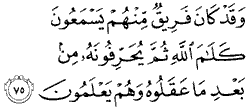Living The Quran
From Issue: 941 [Read full issue]
Perverted Distortions
Al-Baqara (The Cow) Sura 2: Verse 75 (partial)
 "... a party of them heard the word of Allah and then, after having understood it, perverted it knowingly?"
"... a party of them heard the word of Allah and then, after having understood it, perverted it knowingly?"
This verse is addressed to the Muslims, in an aside, as it were, from the main audience, the contemporaneous Jews. The phrase harrafa ash-shay an wajhihi means to turn something away from its right direction. Thus, harrafa al-qawl would mean tahrif or distorting and changing the words or a speech from its true intent. Such a change or distortion can take different forms:
i. To interpret a statement deliberately in a manner contrary to the intent of the speaker;
ii. To change the pronunciation and form of a word beyond recognition. The word Marwah for example has been distorted into Mora or Maria.
iii. To amend a statement or make additions to it in such a way that its real intent is lost, e.g., the distortions in the story of the migration of Prophet Ibrahim, peace be upon him, so as to sever any link between him and the Kaba, the House of Allah, erected by him in Makkah.
iv. To render a word bearing a double meaning in such a manner that manifestly contradicts its context. For example, the Hebrew word ibn has been translated as "son", even though the original word also means a slave or a servant.
v. To raise questions and issues about a matter that is quite clear in order to shroud it in ambiguity, pervert its real intent, and confuse others.
It is also important to bear in mind that a distortion is committed only when it is done intentionally and deliberately. That is why the Quran qualifies its statement by adding that they "perverted it knowingly, after having understood it". It is this knowledge and the wilful nature of such distortion that makes it so heinous a crime in this case; it is not out of ignorance, but in spite of the clear knowledge that they possessed. Such people bar themselves from the light that comes with knowledge from Allah.
Compiled From:
"Pondering Over The Qur'an: Surah al-Fatiha and Surah al-Baqarah" - Amin Ahsan Islahi